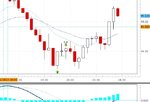See the attachment. This happens constantly. I bring the stop to break even, then it stops out and then continues to nail my target and then some. Well, except when I'm wrong, of course. The problem is that if I let it run without bringing it up to break even then it turns around and stops out. Always. It's uncanny. It makes me think there's something psychological going on. I'm curious if anyone has any idea what it could be?
Stops are the single, major, cause of uncertainty with all traders, especially in the first years. My rule, which I try to obey, is
Once you are in profit, get out at a profit. There will, always, be another time.
Where do you place your stop? The chances are that they are in the same place as lots of other traders.
If it is within reasonable reach, you can be sure that the market will spike and clean the whole lot out. It is business logic and the market is not after you, specifically, although it might seem to you that it is, but is after hundreds of stops, of which yours is only one. I try to place mine well away, in case there is a computer crash, but stop manually. Even after all these years, stop placement is always a problem and I am not always successful.
If you have to leave, then try targets, as well. I do that when I go to work, at lunchtime. There is a spikey period, then, and I put my target at a point worth having. Sometimes, not always, the result can be satisfying..
Remember to keep the account healthy, even if is not by much. Losing can be dispiriting. Much better to be a little ahead, a big move will come.
Good Luck

